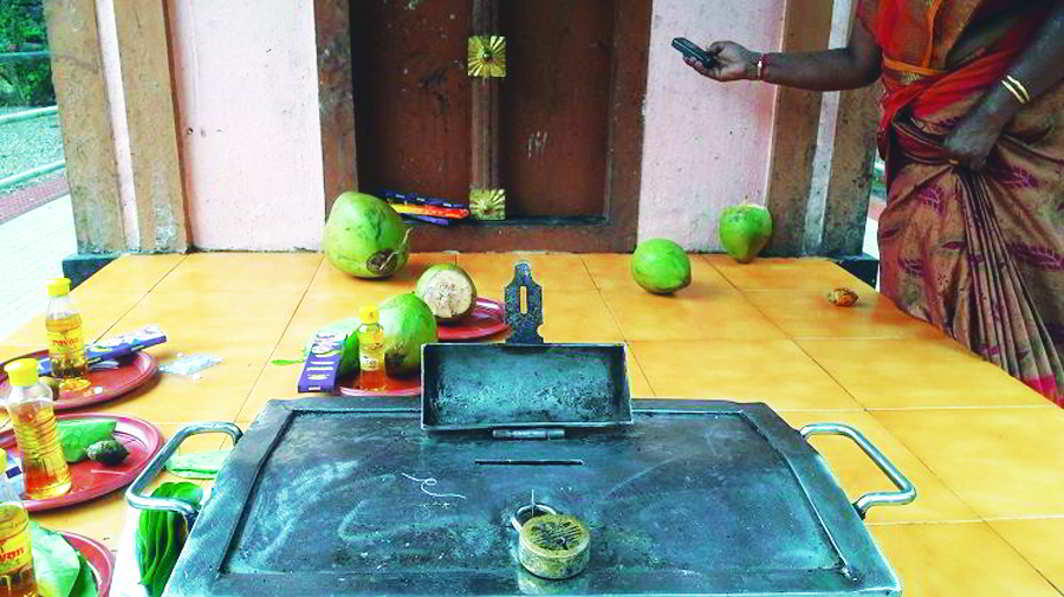Above: Devotees throng the shrine in Kerala hoping for a positive verdict
The cry for justice has led people to build shrines solely devoted to deities and “judge uncles”. India Legal visits one such temple in Kerala
~By Naveen Nair in Thiruvananthapuram
Desperate times call for desperate measures. While building temples for film stars, sportsmen and politicians is nothing new, in Kottayam district in central Kerala, there is a temple for a judge. Called “Judge Ammavan” shrine or “Judge Uncle” shrine, it is part of the 1,100-year-old Cheruvally Devi Temple. It is now a pilgrim spot, not just for the common man, but for those entangled in bitter legal battles who believe that if you need a judgment in your favour, then Judge Uncle, the presiding deity here, will get it done for you.
So widespread is the popularity of this deity that even celebrities come from near and far to pray to him. This includes politicians J Jayalalithaa and K Karunakaran, cricketer S Sreesanth who was caught in the IPL spot-fixing fiasco in 2013 and Mollywood actor Dileep, who is behind bars for allegedly masterminding the rape of a co-star. They have either come here personally or sent their families to pray on their behalf. How far this has worked is questionable. But in Dileep’s case, Judge Uncle did not bestow his blessings as the superstar was denied bail three times by the Kerala High Court this month.
POPULAR SHRINE
Despite this, litigants flock to this shrine before a crucial judgment date, hoping that Judge Uncle will work his wonders on them. “Many people come here just to pray at this shrine in spite of it being the secondary deity. The main deity of the shrine is a goddess but because less people pray there and many prefer to pray to ‘Judge Ammavan’, the temple authorities decided to open this one in the evening after the main shrine has been shut,” said Suresh Kumar, who stays close to the temple.

C Ajayan, an official of the Devaswom Board that governs the temple, said: “Though we have people coming from every part of the country, it is predominantly south Indians who are aware of this temple and make a visit. People with petty cases against them to more heinous ones such as murder and rape come here to seek the blessings of Judge Uncle. There is no preferential treatment for anyone here as we believe that all are equal before the law. But you cannot get judgments in your favour if you have actually done a crime. The belief is that the deity will not stand for injustice,” added a villager who is closely associated with the temple.
Radha Madhusudhanan, 55, who hails from Chengannur, some 38 km from Kottayam, has come to the temple seeking justice for her son, Sandeep, who was arrested for robbery and is in jail. She claims that he is innocent and has come to plead with Judge Uncle for a favourable verdict the next time he is presented for bail. A few weeks ago, a mining baron from Andhra Pradesh had visited the temple and conducted special pujas there. His case had come up before the Andhra Pradesh High Court last week, though no one knows what the outcome was, said Kumar.
Ironically, sometimes the pleas are to prevent people from entering other shrines. Last year, the Travancore Devaswom Board, led by its president, Prayar Gopalakrishnan, had visited the Judge Uncle shrine to seek a favourable verdict from the apex court in the case relating to the entry of women in Sabarimala, a famous shrine in Kerala. However, the Kerala state informed the Supreme Court that it was not against allowing women from entering Sabarimala.
TRAVANCORE CONNECTION
Situated within the premises of the ancient Cheruvally Devi Temple, the legend of Judge Uncle originated from one Govinda Pillai, who was the royal judge in the erstwhile Travancore kingdom of Dharmaraja Karthika Thirunal Rama Varma. Pillai was a luminary and is said to be the chief justice at what was then called the “Sadar Court”, an equivalent of today’s High Court.
Even celebrities come from near and far to pray to Judge Uncle. This includes politicians J Jayalalithaa and K Karunakaran and cricketer S Sreesanth.
During his rule, Padmanabha Pillai who was Govinda Pillai’s nephew, was caught in a case which warranted a death sentence. The uncle issued the verdict and executed his nephew, only to learn later that the evidence against him was false. Out of remorse, the senior Pillai asked the king to punish him, whereupon the royal asked him to write the verdict himself. The story goes that Pillai awarded a death penalty to himself and requested the king to exhibit his lifeless body hanging from a tree for three days.
Meanwhile, a ghost story originated, with villagers believing that Pillai’s soul was still roaming around, especially at night. Following this, pujas were conducted and the soul of the departed judge was accommodated inside the ancestral temple of his family, which is today the Cheruvally Devi Temple.
Whatever be the legend, many people believe that in the times that we live in, a just and honest judge like Govinda Pillai is worthy of worship. And for those who have spent years in litigation, Judge Uncle definitely provides some solace.
Also Read: For whom the bells toll


